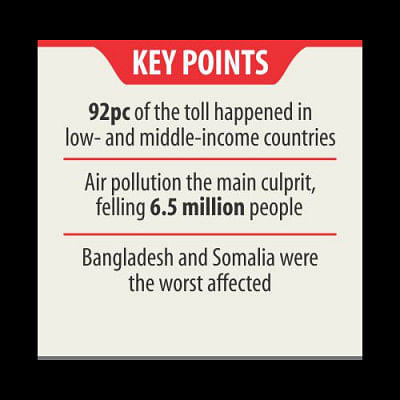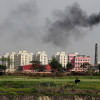Pollution biggest killer

Pollution claimed the lives of nine million people in 2015, one in every six deaths that year, according to a report published yesterday.
These premature deaths accounted for 16 percent of all deaths worldwide that year -- three times more deaths than from AIDS, tuberculosis and malaria combined and 15 times more than from all wars and other forms of violence, found the research published in The Lancet medical journal.
Almost all the deaths, 92 percent, happened in low- and middle-income countries, it said, with air pollution the main culprit, felling 6.5 million people, reports AFP.
Most of these deaths were caused by non-infectious diseases linked to pollution, such as heart disease, stroke and lung cancer.
Bangladesh and Somalia were the worst affected while Brunei and Sweden had the lowest numbers of pollution-related deaths, according to the BBC.
Almost half of the total toll came from just two countries -- India and China.
In rapidly-industrialising countries such as India, Pakistan, China, Bangladesh, Madagascar and Kenya, pollution can account for as many as one in four deaths, researchers said.
"Pollution and related diseases most often affect the world's poor and powerless, and victims are often the vulnerable and the voiceless," said co-author Karti Sandilya of Pure Earth, an anti-pollution NGO.
With global welfare losses of about $4.6 trillion (3.9 trillion euros) per year, the economic cost of pollution-related deaths and disease is also concentrated in the developing world.
"Proportionally, low-income countries pay 8.3 percent of their gross national income to pollution-related death and disease, while high-income countries pay 4.5 percent," said the researchers.
Aside from outright poisoning, pollution causes an array of deadly ailments such as heart disease, stroke, lung cancer and chronic obstructive pulmonary disease.
The deadliest form, responsible for more than two-thirds of deaths, was air pollution, they added.
CALL TO ACTION
This includes outdoor pollution from factory and car emissions, and indoor pollution from wood, charcoal, coal, dung or crop waste being burnt for heating and cooking.
After water pollution in second place with 1.8 million deaths, "workplace pollution including exposure to toxins and carcinogens was linked to 0.8 million deaths," said the report.
These included the lung disease pneumoconiosis in coal workers, bladder cancer in dye workers, and asbestosis and lung cancer in workers exposed to asbestos.
"Lead pollution was linked to 0.5 million deaths that resulted from high blood pressure, renal failure and cardiovascular disease," said the report.
In a separate comment, The Lancet editors Pamela Das and Richard Horton said the report came at a "worrisome time, when the US government's Environmental Protection Agency, headed by Scott Pruitt, is undermining established environmental regulations."
The latest findings, they added, should serve as a "call to action".
"Pollution is a winnable battle.... Current and future generations deserve a pollution-free world," the pair wrote.
Pruitt announced this month the US would pull out of former president Barack Obama's Clean Power Plan.
There was some good news in the report too.
Deaths due to water and household air pollution dropped from 5.9 million in 1990 to 4.2 million in 2015, said the report authors, as poor countries became richer.
On the other hand, deaths from pollution associated with industrial development -- such as outdoor air pollution, chemical and soil pollution, increased from 4.3 million to 5.5 million over the same period.

 For all latest news, follow The Daily Star's Google News channel.
For all latest news, follow The Daily Star's Google News channel. 








Comments